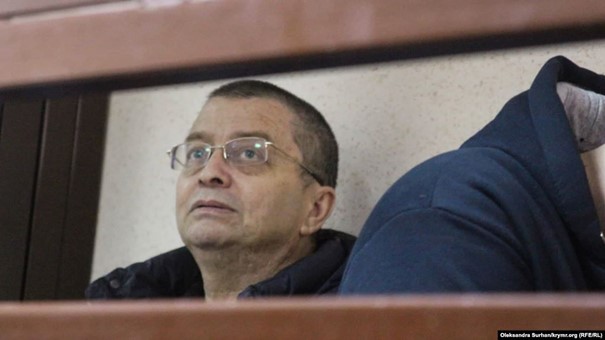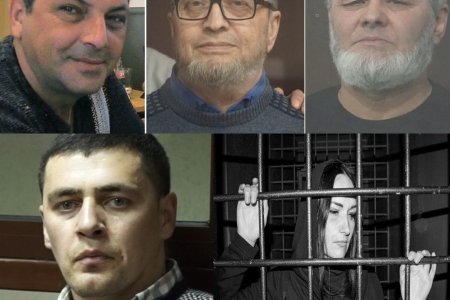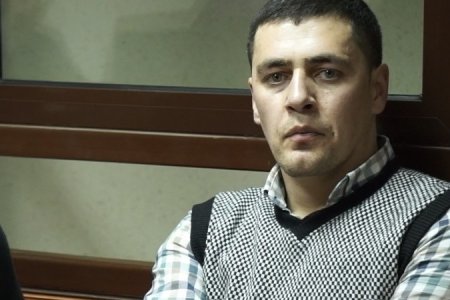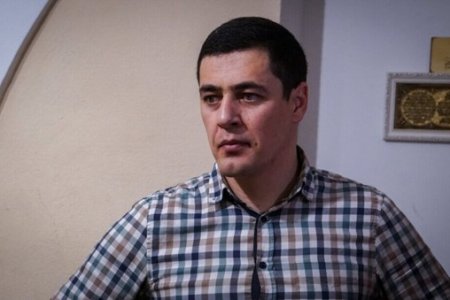
Russia’s Investigative Committee has refused to initiate criminal proceedings against prison administrative and medical personnel whose actions or failure to act were directly responsible for the death of Dzhemil Gafarov. The 61-year-old Crimean Tatar political prisoner had been illegally imprisoned for almost four years, despite medical conditions that, even by Russian standards, should have precluded his detention, and that were gravely exacerbated by the appalling conditions in Russian SIZ [remand prisons].
In reporting the refusal, lawyer Rifat Yakhin told Crimean Solidarity that the decision was predictable, with all those involved protecting one another. Yakhin does not yet know whether he will challenge this decision. All such appeals, he says, are a priori doomed to receive analogous refusals. In a political case, like that of Dzhemil Gafarov, “nobody wants to buck the system”.
That does not make it any the less unlawful, Yakhin stresses. The Investigative Committee’s check was not objective, with only the head of the SIZO [remand prison] and the paramedic questioned. Both merely set out the facts, although even they acknowledged that Gafarov had constantly complained about his deteriorating condition. The Investigative Committee clearly had no interest in getting to the truth. They claimed that the paramedic S.I. Kudym had told them that Gafarov had often asked for help, and that “his requests were carried out”. This same individual also claimed that Gafarov “had on several occasions undergone treatment and was under active observation of the medical unit”.
The ‘investigators’ did not speak with Gafarov’s cellmates at SIZO No. 3 in Novocherkassk. The latter could have told them how they watched Gafarov “effectively die before their eyes.” They had also not talked to the guards involved in the draining journey from SIZO No. 5 in Rostov to the SIZO in Novocherkassk where he died.
T.Y. Gugliakina, head of medical unit No. 14, asserted that Gafarov had been brought to the unit on 8 February 2023, that he had been examined and that he had, supposedly, not complained of anything. He had been placed in quarantine, once again, purportedly, without any complaints, but had become ill on 10 February and had called for a doctor. He was found, clearly near death, with efforts to resuscitate him unsuccessful.
Gugliakina denies any wrongful behaviour and claims that all medical assistance was provided in full and in timely manner.
Pavel Lazarenko, the head of SIZO No. 5 in Rostov also acknowledges that Gafarov frequently complained of his condition but asserts that he underwent treatment several times and that he was under the medical unit’s observation.
Lazarenko had received direct warnings from lawyer Edem Semedlyaev about Gafarov’s deteriorating health, severe chest pains, headaches, difficulty in breathing and high blood pressure. Those details backed an urgent application for Gafarov to be placed into a fee-paying hospital for treatment. All of this was clearly ignored. Instead of being hospitalized, Dzhemil Gafarov was transferred to the notoriously bad SIZO in Novocherkassk, with the very journey likely to have still further exacerbated his already critical condition. Lazarenko merely claims that at the point when he was being moved, “Gafarov did not make any complaints about his state of health.”
The supposed ‘investigation’ concluded that nobody had committed any offence and that none of the personnel’s actions had significantly infringed the rights and interests of citizens. As Yakhin pointed out, this was all entirely predictable. The lies cannot obviate the clear responsibility that all those prison staff and so-called medical personnel share for Dzhemil Gafarov’s death.
The recognized political prisoner died on 10 February 2023, just days after Lazarenko & Co. ignored the evident danger to his life and let him be transferred to the Novocherkassk SIZO.
Gafarov had suffered a heart attack in the Rostov SIZO in October 2022. This was clearly recognized by the doctors who even diagnosed two serious conditions that developed after the heart attack. Gafarov had almost not got out of bed since that heart attack and constantly complained of chest pain.
As reported earlier, there was grave concern for Gafarov’s condition from March 2019 when he became one of 25 civic journalists and activists targeted in Russia’s worst attack on the Crimean Tatar human rights movement to date. In November that year a petition was launched over Gafarov’s detention, with this stressing that his diagnosis, even by Russian law, meant that he should not be in detention. Various methods were used to get around this, such as neglecting the procedure required for Gafarov to retain his disability status, with this then used by the SIZO medical unit as an excuse for claiming that they had no documents confirming his status.
By June 2022 the situation had got so bad that Gafarov was in a prison hospital for two weeks and the doctors did finally acknowledge that he was suffering from a condition that should preclude his detention. Their diagnosis included arteriosclerotic heart disease; post-heart attack cardiosclerosis; angina with chest pressure of classes I and II; chronic kidney insufficiency; chronic inflammation of part of the kidney (chronic interstitial nephritis); third level hypertension; primary arterial hypertension and a very high risk of fourth level cardiovascular complications.
Third level hypertension is listed in the Russian government’s Resolution No. 3 on medical conditions which are incompatible with detention.
This diagnosis was read out at a hearing of the Southern District Military Court in Rostov (Russia) by presiding judge Valery Opanasenko. Neither then, however, nor in October did Opanasenko order his release, at least under house arrest. On 27 October 2022, Gafarov had a heart attack, yet even then the ambulance team lacked the courage to insist that he be hospitalized. Gafarov informed the court that he was suffering agonizing pain in his joints, and pleaded for at least a reduction in the number of hearings to one a week so that he could recover each time from the extra strain of having to walk upstairs, sit for a long time in one position, etc. Rather than heeding Gafarov’s plea, Opanasenko actually speeded up the process, and effectively denied all five defendants, including Gafarov, their right to make a final address to the court.
On 11 January 2023, ‘judges’ Valery Opanasenko, together with Andrei Zarya and Stanislav Zhidkov, sentenced two gravely ill men: Dzhemil Gafarov and Servet Gaziev (63) as well as three younger Crimean Tatar civic activists to 13 years’ harsh-regime imprisonment. Such sentences had been demanded by prosecutors Alexander Bondarev and Igor Nadolinsky, who were equally well aware that for two of the men these were death sentences. All of the above, as well as the FSB ‘investigators’, and others implicated in these ‘trials’ also knew that they were seeking the imprisonment of men who had committed no crime, with the charges against them deriving solely from harmless discussions on religious and political topics three years before their arrest and on the ‘testimony’ of anonymous witnesses.
Dzhemil Gafarov was a political prisoner, and, while the above individuals doubtless bear responsibility for his death, so too do all those craven ‘judges’, prosecutors and, of course, the FSB, who took him prisoner on 27 March 2019. All of them played a role in torturing a gravely ill man to death.
Russia is continuing to do the same with other political prisoners, with the life of Amet Suleimanov in particular and immediate danger.
See: Gravely ill Crimean Tatar civic journalist sent to certain death in Russian prison
Russia has killed two Ukrainian political prisoners and is endangering at least 21 others
Please help by asking your elected representatives, media and human rights organizations to intervene on behalf of Amet Suleimanov. It is also vital that all of those who take part in implementing such effective death sentences on political grounds are subjected to international sanctions. Each of us can help ensure that they are, at least in that way, held to account.


